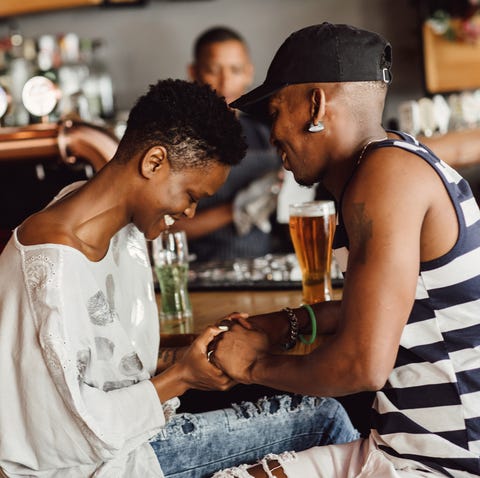Unconditional Love Doesn't Stab You in the Back
If look at any rom-com, it seems like it's pretty easy to know whether or not you're in love. Your heart starts to race. Your palms start to sweat. You find yourself fumbling your words around the object of your desire. But of course, life isn't anything like the movies. There aren't any big, clichéd events that lead to an obvious moment where you and the person you love fall into one another's arms. But there are little hints that might point to the fact that you have more than just a fleeting infatuation with the person you've been seeing. And here's the thing — you've likely already experienced them before.
"When you fall in love, you often feel an obsessive connection to your partner," Dr. Jess O'Reilly, Astroglide's resident sexologist, tells Woman's Day. "You can't stop thinking about them. You idealize them. They seem perfect, and you want more and more of them."
Think back to the last time you really felt a connection with someone. You likely spent your days daydreaming about them, and tried to find ways to work their name into every and any conversation. That, according to Dr. O'Reilly, is love.

Hello World
There are also bodily functions and familiar feelings that are associated with being head over heels. You know those butterflies you tend to feel when your significant other walks into the room? There's a reason for that. "It's really just your digestive tract and anal sphincter responding to the nerves and excitement of the unknown," Dr. O'Reilly says. Not exactly sexy, but hey, love isn't always, right?
Your heart rate might also spike, and you may indeed start to sweat everywhere — not just your palms. "The increase in adrenaline might cause you to sleep less while enjoying a high level of energy," she says. Your mood is also likely to experience a lift, as dopamine courses through your body, resulting in you experiencing everyday interactions as pleasurable.
"This is falling in love," O'Reilly says.

Westend61
Great — so now what? Well, if your love isn't returned, things get tricky. "Unrequited love can be painful for both the rejected and the rejecter," O'Reilly says. She points out that unrequited love can come in many forms. You could fall in love with a friend, or find yourself falling back in love with a partner you'd previously fell out of love with.
"It's important to note that fulfilling relationships are based on mutual consent, desire, and investment in connection," she says. "You won't be able to cultivate a happy, lasting relationship if you and your partner aren't similarly invested in the same outcome. If they've told you that they're not interested, you'll need to accept their decision, and work through your own feelings."
If you and your partner are both similarly attracted to and in love with one another, taking things to the next level may be harder than you actually think. "The feeling of love comes easily," O'Reilly says. "The action of loving required ongoing investment."
This is when communication is important. Talking with your significant other about the future, and where you see your love going, is a crucial step in maintaining that love connection. "Staying together also involves a separate chemical process, as well as ongoing effort to improve understanding," O'Reilly says.
This content is imported from {embed-name}. You may be able to find the same content in another format, or you may be able to find more information, at their web site.
She also points out that things won't feel the same months into your love or your relationship as they did in the beginning. That adrenaline rush you experienced that seemed to make everything you did beautiful? Yeah — that doesn't really last. But O'Reilly maintains that this is a good thing. "Loving over the long term may require that you cultivate some of the new-love passion to keep things exciting," she says. "Look for opportunities to create excitement, novelty, and change." That could be anything from booking a new, exciting trip to trying out some new positions in the bedroom.
"I think it's important to differentiate between love as a feeling and love as an action," O'Reilly points out. "If you're not showing one another love, it's not likely a viable relationship — regardless of how you feel. You can feel love without really knowing someone." So it's important, once you've established that these are the feelings you're having, to act on them to maintain them.
The feeling of love, alone, is a shaky foundation to build a relationship on. What makes it strong is mutual respect, open communication, and understanding. Keep those in mind, and you'll be able to move from fleeting feeling to long-term loving.
This content is created and maintained by a third party, and imported onto this page to help users provide their email addresses. You may be able to find more information about this and similar content at piano.io
Unconditional Love Doesn't Stab You in the Back
Source: https://www.womansday.com/relationships/dating-marriage/a31491751/being-in-love-signs-meaning/
0 Response to "Unconditional Love Doesn't Stab You in the Back"
Post a Comment